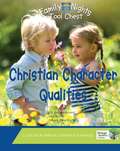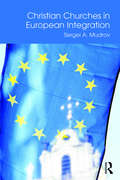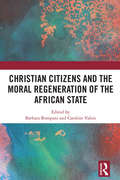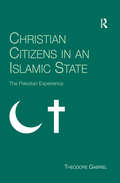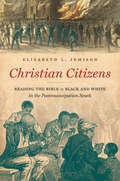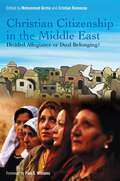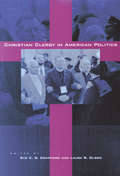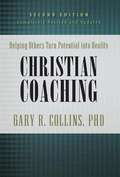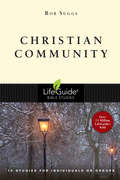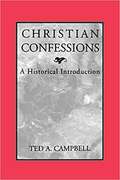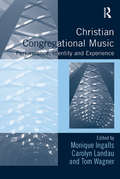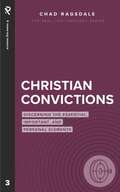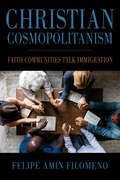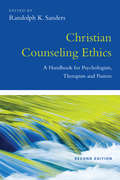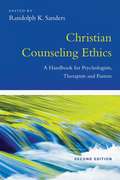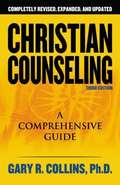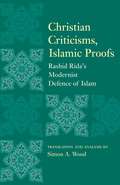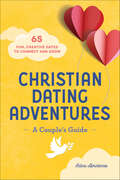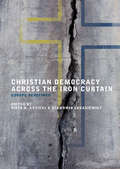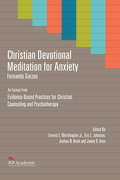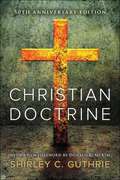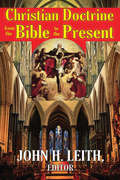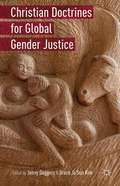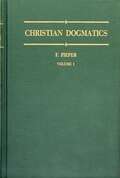- Table View
- List View
Christian Character Qualities
by Kurt Bruner Jim WeidmannThis book contains complete and clear plans for helping kids learn more about Christian characters and qualities.
Christian Churches and Their Peoples, 1840-1965
by Nancy Christie Michael GauvreauReligious institutions, values, and identities are fundamental to understanding the lived experiences of Canadians in the nineteenth- and early twentieth-century. Christian Churches and Their Peoples, an inter-denominational study, considers how Christian churches influenced the social and cultural development of Canadian society across regional and linguistic lines.By shifting their focus beyond the internal dynamics of institutions, Nancy Christie and Michael Gauvreau address broad social issues such as the ways in which religion is linked to changing mores, the key role of laypeople in shaping churches, and the ways in which First Nations peoples both appropriated and resisted missionary teachings. With an important analysis of popular religious ideas and practices, Christian Churches and Their Peoples demonstrates that the cultural authority and regulatory practices of religious institutions both affirmed and opposed the personal religious values of Canadians, ultimately facilitating their elaboration of personal, ethnic, gender, and national identities.
Christian Churches in European Integration
by Sergei A. MudrovAll too often religion is largely ignored as a driver of identity formation in the European context, whereas in reality Christian Churches are central players in European identity formation at the national and continental level. Christian Churches in European Integration challenges this tendency, highlighting the position of churches as important identity formers and actors in civil society. Analysing the role of Churches in engaging with two specific EU issues – that of EU treaty reform and ongoing debates about immigration and asylum policy – the author argues that Churches are unique participants in European integration. Establishing a comprehensive view of Christian Churches as having a vital role to play in European integration, this book offers a substantial and provocative contribution both to our understanding of the European Union and the broader question of how religious and state institutions interact with one another.
Christian Citizens and the Moral Regeneration of the African State
by Barbara Bompani Caroline ValoisIn recent years the rapid growth of Christian charismatic movements throughout sub-Saharan Africa has drastically reconfigured the region’s religious landscape. As a result, charismatic factions play an increasingly public role throughout Africa, far beyond the religious sphere. This book uses a multi-disciplinary approach to consider the complex relationship between Pentecostal-charismatic Christianity and the socio-political transformation taking place throughout this region. Each of this text’s three main sections helps in understanding how discourses of moral regeneration emanating from these diverse Christian communities, largely charismatic, extend beyond religious bounds. Part 1 covers politics, political elites and elections, Part 2 explores society, economies and the public sphere, and Part 3 discusses values, public beliefs and morality. These sections also highlight how these discourses contribute to the transformation of three specific social milieus to reinforce visions of the Christian citizen. Examining contemporary examples with high quality scholarly insight, this book is vital reading for academics and students with an interest in the relationship between religion, politics and development in Africa.
Christian Citizens in an Islamic State: The Pakistan Experience
by Theodore GabrielChristian Citizens in an Islamic State deals with the important question of inter-faith relations in Pakistan, a vital region of the Islamic world which has been the scene of the rise of both Islamic militancy and partnership with the West in counter-terrorism measures. Christians are the most important religious minority of Pakistan and their status and experience is a test case of the treatment of religious minorities in an Islamic state. This book covers new ground in exploring the various factors that govern the relations between Muslims and Christians in a nation state which has been politically unstable in the past, and where the imposition of Islamic law has been controversial and problematic for religious minorities. Theodore Gabriel clarifies the history of Christian-Muslim relations in the region, explores the rise of Islamic militancy, and draws on personal interviews to determine the mind set of both Christians and Muslims in Pakistan today.
Christian Citizens: Reading the Bible in Black and White in the Postemancipation South
by Elizabeth L. JemisonWith emancipation, a long battle for equal citizenship began. Bringing together the histories of religion, race, and the South, Elizabeth L. Jemison shows how southerners, black and white, drew on biblical narratives as the basis for very different political imaginaries during and after Reconstruction. Focusing on everyday Protestants in the Mississippi River Valley, Jemison scours their biblical thinking and religious attitudes toward race. She argues that the evangelical groups that dominated this portion of the South shaped contesting visions of black and white rights. Black evangelicals saw the argument for their identities as Christians and as fully endowed citizens supported by their readings of both the Bible and U.S. law. The Bible, as they saw it, prohibited racial hierarchy, and Amendments 13, 14, and 15 advanced equal rights. Countering this, white evangelicals continued to emphasize a hierarchical paternalistic order that, shorn of earlier justifications for placing whites in charge of blacks, now fell into the defense of an increasingly violent white supremacist social order. They defined aspects of Christian identity so as to suppress black equality—even praying, as Jemison documents, for wisdom in how to deny voting rights to blacks. This religious culture has played into remarkably long-lasting patterns of inequality and segregation.
Christian Citizenship in the Middle East: Divided Allegiance or Dual Belonging?
by Nigel Biggar Mohammed Girma Ben Ryan Casey Strine Cristian Romocea Issa Diab Najib Awad Paul S. WilliamsFor Christians living as a persecuted minority in the Middle East, the question of whether their allegiance should lie with their faith or with the national communities they live in is a difficult one. This collection of essays aims to reconcile this conflict of allegiance by looking at the biblical vision of citizenship and showing that Christians can live and work as citizens of the state without compromising their beliefs and make a constructive contribution to the life of the countries they live in. The contributors come from a range of prestigious academic and religious posts and provide analysis on a range of issues such as dual nationalism, patriotism and the increase of Islamic fundamentalism. An insightful look into the challenges religious minorities face in countries where they are a minority, these essays provide a peace-building and reconciliatory conclusion for readers to consider.
Christian Clergy in American Politics
by Sue E. S. CrawfordIn recent decades, Christian clergy have ever more frequently had to decide whether to become involved in politics. When they do become involved, their influence can be substantial. In this book Sue E. S. Crawford, Laura R. Olson, and their coauthors explore the political choices clergy make and the consequences of these choices. Drawing on personal interviews and statistical data to place the actions of clergy in both their religious and secular contexts, the authors study mainline and evangelical Protestant, Catholic, and Mennonite communities. They examine the role of white, African American, and female religious leaders. And they address issues of local development, city government, and national and international politics.Contributors: Christi J. Braun, Boston University School of Law • Timothy A. Byrnes, Colgate University • James C. Cavendish, University of South Florida • Sue E. S. Crawford, Creighton University • Katie Day, Lutheran Theological Seminary at Philadelphia • Melissa M. Deckman, Washington College • Paul A. Djupe, Denison University • Joel S. Fetzer, Central Michigan University • James L. Guth, Furman University • Ted G. Jelen, University of Nevada-Las Vegas • Laura R. Olson, Clemson University • James M. Penning, Calvin College • Mary R. Sawyer, Iowa State University • Corwin E. Smidt, Calvin College
Christian Coaching: Helping Others Turn Potential into Reality
by Gary R. CollinsWith a biblically based approach, this groundbreaking textbook for life coaching presents a coaching model using how-to sections field-tested for more than eight years, custom forms coaches can use, and more.
Christian Community (LifeGuide Bible Studies)
by Rob SuggsOne of the greatest gifts that Christ has given us is each other. Through Christ's body, the church, we discover our unique gifts and experience worship, healing and power. In this ten-session LifeGuide Bible Study, Rob Suggs leads us to grow in community���loving and nurturing one another, and in reflecting Christ's love to the world around us. For over three decades LifeGuide Bible Studies have provided solid biblical content and raised thought-provoking questions���making for a one-of-a-kind Bible study experience for individuals and groups. This series has more than 130 titles on Old and New Testament books, character studies, and topical studies. PDF download with a single-user license; available from InterVarsity Press and other resellers.
Christian Confessions: A Historical Introduction
by Ted A. CampbellThe historic teachings of four major Christian traditions--Eastern Orthodoxy, Roman Catholicism, Reformation and Union Churches, and Evangelical and Free churches--are set forth here in a comparative framework. Following a brief historical introduction of each tradition, Ted Campbell provides an extensive overview of the tradition's beliefs on religious authority, God and Christ, human nature and salvation, and church, ministry, and the sacraments. He concludes by considering whether a definable core of Christian teachings cuts across denominational and confessional boundaries.
Christian Congregational Music: Performance, Identity and Experience (Congregational Music Studies Series)
by Tom Wagner Monique Ingalls Carolyn LandauChristian Congregational Music explores the role of congregational music in Christian religious experience, examining how musicians and worshippers perform, identify with and experience belief through musical praxis. Contributors from a broad range of fields, including music studies, theology, literature, and cultural anthropology, present interdisciplinary perspectives on a variety of congregational musical styles - from African American gospel music, to evangelical praise and worship music, to Mennonite hymnody - within contemporary Europe and North America. In addressing the themes of performance, identity and experience, the volume explores several topics of interest to a broader humanities and social sciences readership, including the influence of globalization and mass mediation on congregational music style and performance; the use of congregational music to shape multifaceted identities; the role of mass mediated congregational music in shaping transnational communities; and the function of music in embodying and imparting religious belief and knowledge. In demonstrating the complex relationship between ’traditional’ and ’contemporary’ sounds and local and global identifications within the practice of congregational music, the plurality of approaches represented in this book, as well as the range of musical repertoires explored, aims to serve as a model for future congregational music scholarship.
Christian Convictions: Discerning the Essential, Important, and Personal Elements (Real Life Theology)
by Chad RagsdaleA CHRISTIAN’S GUIDE TO THE MOST CENTRAL ELEMENTS OF OUR FAITH If the Bible’s teachings were a target, which teachings would be at its bullseye? And what elements of faith are non-essential matters of personal preference? Christians unable to tell the difference between essential, important, and personal elements of Christianity are risking significant errors. On the one hand, Christians who treat personal elements as essential to the faith fall into a sectarianism that misses the point of Christianity. On the other hand, Christians who treat essential elements as unimportant slide into a progressivism that will eventually rewrite the script of Christianity. Christian Convictions guides the reader into a discerning faith that majors in the majors.
Christian Cosmopolitanism: Faith Communities Talk Immigration (Religious Engagement in Democratic Politics)
by Felipe Amin FilomenoWhile religious institutions have been gateways for immigrants into local communities, religion has also coalesced with nationalism to discriminate against foreigners. Felipe Amin Filomeno asks, can “deliberative dialogues” about immigration in Christian congregations play a cosmopolitan role and bridge differences of nationality, race, and culture regarding immigration? To find the answer, he visited numerous Christian congregations in Baltimore with varying demographic makeups to discuss intergroup tensions and similarities in their communities. He developed dialogues to promote mutual understanding and collaboration between immigrants and U.S.-born people in religious spaces. Christian Cosmopolitanism shows that mutual understanding can result when people share their personal stories, feelings, and thoughts about immigration. They reflect and deliberate on collaborative action to advance common interests and shared values, which can unleash the cosmopolitan potential of the Christian community. Including practical tools for church leaders, Christian Cosmopolitanism promotes dialogue as a cultural practice that can help diverse communities overcome segregation and become socially cohesive.
Christian Counseling Ethics: A Handbook for Psychologists, Therapists and Pastors (CAPS)
by Randolph K. Sanders"For the clients who see us in counseling . . . theological purity will make little difference if we do not practice with ethical integrity." Randolph K. Sanders, from chapter one The work of psychotherapy and counseling is full of ethical challenges and dilemmas. Responding to these situations with wisdom is critical, not only for the professional?s credibility, but also for good therapeutic relationships and positive treatment outcomes. Since its first publication, Christian Counseling Ethics has become a standard reference work for Christian psychologists, counselors and pastors and a key text at Christian universities and seminaries. This thoroughly revised edition retains core material on counseling ethics that has made it so valuable in a variety of settings. Now fully updated, it weighs and assesses new and emerging ethical issues in the field. For example, the current volume explores ethical issues involved in: • multiple relationships • confidentiality • documentation • therapist competence and character • addressing spiritual and value issues in therapy • teletherapy • individual and couples therapy • counseling with minors • psychological first aid after disasters • counseling crossculturally In addition, the book considers dilemmas Christian therapists face in specific settings such as: • church-based counseling centers • government and military institutions • missions organizations • college counseling centers Psychologist Randolph Sanders has assembled a distinguished team of clinicians and academicians to address the issues. They include W. Brad Johnson, Alan Tjeltveit, Everett Worthington, Sally Schwer Canning, Siang-Yang Tan, Tamara Anderson, Stanton Jones, Jennifer Ripley, Angela Sabates, Mark Yarhouse, Richard Butman and Cynthia Eriksson.
Christian Counseling Ethics: A Handbook for Psychologists, Therapists and Pastors (Second Edition)
by Randolph K. Sanders"For the clients who see us in counseling . . . theological purity will make little difference if we do not practice with ethical integrity. "Randolph K. Sanders, from chapter oneThe work of psychotherapy and counseling is full of ethical challenges and dilemmas. Responding to these situations with wisdom is critical, not only for the professional's credibility, but also for good therapeutic relationships and positive treatment outcomes. Since its first publication, Christian Counseling Ethics has become a standard reference work for Christian psychologists, counselors and pastors and a key text at Christian universities and seminaries. This thoroughly revised edition retains core material on counseling ethics that has made it so valuable in a variety of settings. Now fully updated, it weighs and assesses new and emerging ethical issues in the field. For example, the current volume explores ethical issues involved in:multiple relationshipsconfidentialitydocumentationtherapist competence and characteraddressing spiritual and value issues in therapyteletherapyindividual and couples therapycounseling with minorspsychological first aid after disasterscounseling crossculturallyIn addition, the book considers dilemmas Christian therapists face in specific settings such as:church-based counseling centersgovernment and military institutionsmissions organizationscollege counseling centersPsychologist Randolph Sanders has assembled a distinguished team of clinicians and academicians to address the issues. They include W. Brad Johnson, Alan Tjeltveit, Everett Worthington, Sally Schwer Canning, Siang-Yang Tan, Tamara Anderson, Stanton Jones, Jennifer Ripley, Angela Sabates, Mark Yarhouse, Richard Butman and Cynthia Eriksson.
Christian Counseling: A Comprehensive Guide
by Gary R. CollinsThe classic counseling handbook for churches, classrooms, and the helping professions. <P><P> This revised and expanded third edition of Gary R. Collins's comprehensive counseling guide offers solid biblical teaching on how to counsel and wise guidance on a broad range of situations counselors are likely to encounter. Christian Counseling provides updated, extensive coverage of the most common issues troubling those who seek counseling, such as Abuse Addictions Aging Anxiety Career decisions Crises Depression Grief Inferiority Marriage and relationship problems Clearly written and easy-to-read, Christian Counseling provides lasting value as a textbook for students and their professors, a training tool for lay counselors, a source of information for those seeking a greater understanding of human behavior, and a primer on the biblical foundation for Christian counseling.
Christian Criticisms, Islamic Proofs: Rashid Rida's Modernist Defence of Islam
by Simon A. WoodMuhammad Rashid Rida is among the most influential Muslim thinkers of the modern period and yet, until this book, his writings on religious reform remained unpublished in English. In this paperback version of the flagship English edition, esteemed academic Simon A. Wood rights this wrong by translating and analysing one of his most important works, The Criticisms of the Christians and the Arguments of Islam. Responding to arguments made in the ninetenth century that Islam is 'irrational' or 'inferior to Christianity', and that the unification of religious and political power is a 'barrier to progress', Rida sought to defend Islam and often charged Christianity of its own brand of irrationality. Wood analyses these arguments, showing that Rida's work cannot be separated from the period of colonial humiliation in which it originated. He also takes on the traditional accusation that Rida was a fundamentalist and argues that he was in fact distinctly modernist. Simon A. Wood is Associate Professor of Religious Studies at the University of Nebraska-Lincoln. He is a leading expert on Rashid Rida.
Christian Dating Adventures: A Couple's Guide
by Selina AlmodovarDiscover fulfilling date ideas for building a strong, faith-based connection Deepen your relationship, strengthen your faith, and have fun! No matter how long you've been together, Christian Dating Adventures is packed full of memorable date ideas perfect for any Christian couple. Nurture your connection with your partner and with God as you watch a sunrise, go on an impromptu road trip, or volunteer together within your church or community.Go beyond other dating books with:Dates for every occasion—Find ideas that are ideal for quiet nights at home, exciting outdoor adventures, group dates, holidays, and more.Faith-based guidance—Keep God in the center of your relationship through Scripture, discussion, and spiritual insights.Tips for couples—Make sure every date—whether it's your first or fiftieth—is memorable and meaningful with thoughtful advice for getting the most out of each experience.Grow closer together through the power of your faith with this dating book for Christian couples.
Christian Democracy Across the Iron Curtain: Europe Redefined
by Piotr H. Kosicki Sławomir ŁukasiewiczThis book is the first scholarly exploration of how Christian Democracy kept Cold War Europe's eastern and western halves connected after the creation of the Iron Curtain in the late 1940s. Christian Democrats led the transnational effort to rebuild the continent's western half after World War II, but this is only one small part of the story of how the Christian Democratic political family transformed Europe and defied the nascent Cold War's bipolar division of the world. The first section uses case studies from the origins of European integration to reimagine Christian Democracy's long-term significance for a united Europe. The second shifts the focus to East-Central Europeans, some exiled to Western Europe, some to the USA, others remaining in the Soviet Bloc as dissidents. The transnational activism they pursued helped to ensure that, Iron Curtain or no, the boundary between Europe's west and east remained permeable, that the Cold War would not last and that Soviet attempts to divide the continent permanently would fail. The book's final section features the testimony of three key protagonists. This book appeals to a wide range of audiences: undergraduate and graduate students, established scholars, policymakers (in Europe and the Americas) and potentially also general readerships interested in the Cold War or in the future of Europe.
Christian Devotional Meditation for Anxiety: Chapter 4, Evidence-Based Practices for Christian Counseling and Psychotherapy (Christian Association for Psychological Studies Books)
by Fernando GarzonEvidence-Based Practices for Christian Counseling and Psychotherapy,
Christian Doctrine
by Shirley GuthrieChristian Doctrine has introduced thousands of laity, students, and theologians to the tenets of the Christian faith. This edition reflects changes in the church and society since the publication of the first edition and takes into account new works in Reformed theology, gender references in the Bible, racism, pluralism, ecological developments, and liberation theologies.
Christian Doctrine from the Bible to the Present: A Reader In Christian Doctrine From The Bible To The Present
by John H. LeithChristianity has always been a "creedal" religion in that it has always been theological. It was rooted in the theological tradition of ancient Israel, which was unifi ed by its historical credos and declaratory affi rmations of faith. No pre-theological era has been discovered in the New Testament or in the history of the Christian community. From the beginning Christianity has been theological, involving men in theological refl ection and calling them to declarations of faith. A non-theological Christianity has simply never endured, although such has been attempted, for instance, by individual seers in the sixteenth century and also by collaborators with totalitarian ideologies in the twentieth century.The creeds presented here range from the ancient faith of the Hebrews and the creed-like formulas of the New Testament to the Barmen declaration of 1934 (framed by the Christians in Germany who faced the threat of Nazism) and the Batak Creed of 1951 (in which Indonesian Christians gave authentic expression to their religious belief in the idiom of their own culture. All the creeds are in some sense "offi cial," and every major division of Christendom is represented, including the Younger Churches. The volume ends with the messages of the most important assemblies dealing with the Ecumenical Movement.This single volume, containing all the major theological affi rmations of the Christian community, is a source book for the study of Christian theology. It comprises a record of the Church's interpretation of the Bible in the past and an authoritative guide to its interpretation on the present. Indeed, it is a guide to an understanding of the Christian interpretation of life.
Christian Doctrines for Global Gender Justice
by Grace Ji-Sun Kim Jenny DaggersThis book extends the feminist theology subfield of creative imagining with traditional Christian doctrines. Whether women are welcomed into partnership and ministry or subject to exclusive male leadership, new imaginings are crucial for the twenty-first century global church. In this volume, contributors critically imagine doctrines of God, Christ, the Holy Spirit, Mary, theological anthropology, grace, free will, creativity, and hope with the aim of furthering global gender justice. As they address these doctrines and give shape to new ecotheologies, the volume's diverse set of contributors reflect on constructive projects from within their respective faith traditions. Their writings on the gospel will resonate with the concerns and projects of justice-seeking readers in a myriad of global contexts and locations.
Christian Dogmatics
by Francis Pieper Theodore EngelderA translation of Christliche Dogmatik, Volume 1 addresses: the nature and character of theology; the Holy Scripture; the doctrine of God; Creation; divine providence; angelology; doctrine of man; sin and evil; and more.
